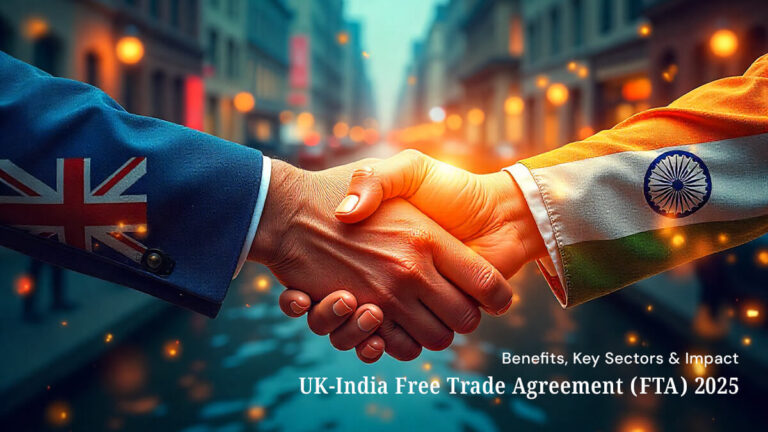
In a move set to reshape economic ties between two major democracies, India and the United Kingdom yesterday finalized a landmark Free Trade Agreement (FTA). Hailed as “historic and ambitious” by the Indian government, the deal promises to boost jobs, slash consumer prices, and turbocharge exports for both nations after years of intense negotiation.
Why This Deal Matters to You
Forget complex trade jargon – this agreement is about tangible benefits for everyday people and businesses:
- Cheaper Prices:Expect lower costs on popular imported goods.
- More Jobs:Key industries in both countries anticipate significant growth and hiring.
- New Opportunities:Businesses get easier access to huge new markets, professionals find it simpler to work across borders.
- Stronger Economies:Billions added to national GDPs, doubling trade within a decade.
The Deal in a Nutshell
- For UK Goods Entering India: 90% of UK products will see lower Indian import taxes (tariffs). Big winners include Scotch whisky, gin, cars, medical devices, cosmetics, and machinery.
- For Indian Goods Entering the UK: A massive 99% of Indian products (covering nearly all trade value) will enter the UK completely duty-free! This is a huge win for Indian textiles, leather goods, footwear, seafood, gems, jewellery, and engineering products.
- Trade Boom: Current trade worth $60 billion (2024) is projected to double to $100 billion by 2030.
- Economic Boost: The UK economy is expected to grow by £3.3 billion by 2035, with an annual boost of £4.8 billion by 2040. India expects major job creation, especially in manufacturing hubs.
- Easier Work & Travel: Professionals (IT experts, engineers, chefs, yoga instructors, investors) will find it simpler to work temporarily in each other’s countries. A key win for India secures a 3-year exemption from UK social security payments for temporary Indian workers.
List of Goods & Categories Getting Cheaper & Easier to Trade
UK Exports Benefiting from Lower Tariffs in India:
- Drinks: Whisky, Gin, Soft Drinks
- Food: Lamb, Salmon, Chocolate, Biscuits
- Cars & Parts: Passenger vehicles, Components (under a quota system)
- Manufactured Goods: Medical Devices, Cosmetics, Aerospace Parts, Electrical Machinery, Optical Products
- Services: Financial Services, Legal Services, Business Services
Indian Exports Benefiting from ZERO Tariffs in the UK:
- Clothing & Textiles: Shirts, Trousers, Dresses, Bed Linen, Yarn, Fabrics
- Leather & Footwear: Shoes, Bags, Leather Garments, Components
- Food & Agriculture: Marine Products (Shrimp, Fish), Grapes, Mangoes
- Manufactured Goods: Sports Goods (Cricket gear, footballs), Toys, Gems & Jewellery, Engineering Goods, Auto Parts, Engines, Organic Chemicals
- Services: IT Services (Software, BPO), Financial Services, Professional Services (Architecture, Engineering), Educational Services
Beyond Goods: Services & People Power
This deal isn’t just about physical products:
- Indian Services Win Big: Ambitious commitments open doors wider for India’s powerhouse IT and tech services sector, financial firms, and professionals in fields like architecture and engineering within the UK market.
- UK Services Gain Certainty: UK financial, legal, and business service providers get more stable access to India’s rapidly growing economy.
- Professional Mobility Boost: Easier rules for business visitors, investors, intra-company transfers, and independent professionals (like chefs, musicians, yoga instructors) to work temporarily. This fulfills a major Indian demand for “greater global mobility for aspirational young Indians.”
- Social Security Relief (DCC): Indian professionals working short-term in the UK (up to 3 years) and their employers won’t have to pay UK social security contributions, making them more cost-competitive. (They still need to pay the UK health surcharge).
The Bigger Picture: Jobs, Growth & Resilience
- Job Creation: Expect significant employment gains in India’s labor-intensive sectors like textiles, leather, footwear, and sports goods. The UK anticipates job growth in high-value manufacturing, clean energy, and services.
- Consumer Wins: UK shoppers get cheaper Indian clothes, shoes, and seafood. Indian consumers benefit from lower prices on UK whisky, cosmetics, and medical equipment.
- Future-Proofing: The deal includes commitments on digital services trade and streamlining customs paperwork, making cross-border business faster and cheaper. Reducing hidden barriers (non-tariff barriers) aims to make supply chains more resilient.
- Strategic Partnership: This FTA cements a deeper economic and strategic relationship between the UK and India, two major G20 economies, at a time of global realignment.
The Bottom Line:
The UK-India FTA is more than a trade deal; it’s an economic bridge connecting two nations with immense potential. By slashing tariffs on a vast array of goods, easing the movement of skilled professionals, and opening service markets, it promises cheaper products for consumers, booming exports for businesses, and significant job creation – a truly “historic and ambitious” step for both economies. Keep an eye on the shelves and job boards – the impact is coming.